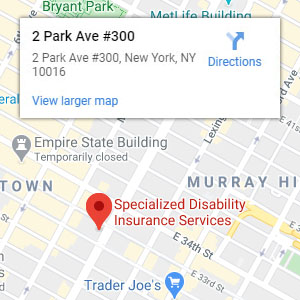In this blog, we will discuss:
- Maternity Leave vs. Disability Insurance Claim
- Pregnancy and Short-Term Disability Policies
- Pregnancy and Long-Term Disability Policies
- Buying Disability Insurance During Pregnancy
- Avoid Consequences of Disability Policy Exclusions
- Key Disability Coverages for Pregnant Women
- Specialized Disability Insurance Specialists in NewYork (NY)
An essential financial planning tool is income protection in the form of disability insurance for women. Disability coverage is especially important for working women who plan to become pregnant. Around 25 percent of all pregnancies involve some kind of complication that can require the mother to be off work longer than expected. Disability insurance for doctors goes farther, to provide enough coverage to secure your financial future against the risk of complications during pregnancy that can cause the loss of a large salary for a prolonged period.
Recovering from births by C-section, overcoming postpartum depression, and other conditions that can prolong healing of the mother after delivery can delay her return to work. The National Institute of Mental Health (NIMH) reports that around 15% of all women who give birth experience postpartum depression. Women need to make sure that their disability coverage includes recovery from these and other conditions associated with pregnancy.
Additionally, pregnancy can trigger the onset of other illnesses and health conditions. So, long-term disability insurance is critical for women at risk of unforeseen adverse health effects following pregnancy.
Maternity Leave vs. Disability Insurance Claim
Taking some time off from the office during or after pregnancy is considered an elective absence from outside employment, so it is not covered under disability insurance. Complications that develop during or at some point after a pregnancy which, for example, cause your doctor to order bed rest or that cause you to become unable to work for some period of time can qualify you to receive disability benefits.
In some employer-sponsored group plans for short-term disability, even a normal pregnancy may be classed as a disability, in lieu of providing a formally defined policy for maternity leave.
Pregnancy and Short-Term Disability Policies
Employer-based short-term disability insurance replaces some portion of your work income, if you are unable to work because of an injury or illness for a relatively brief time period, usually up to a year. With this type of coverage, the length of time between the diagnosis of the disabling condition and the date you receive benefits can be just a few weeks. A short-term disability policy may provide coverage for childbirth when there are complications.
Pregnancy and Long-Term Disability Policies
Like short-term policies, long-term disability coverage replaces a portion of your work income, typically about 60%, if you become disabled. The period of waiting after diagnosis until benefit disbursements begin can take a few months all the way to a whole year. But, the period of benefit payments with long-term disability insurance benefits can continue for years, even until your retirement. Some employers provide long-term disability plans, but many people buy their own individual coverage from private insurance carriers.
Long-term insurance carriers do not consider giving birth as a health issue that is eligible for disability benefits, whether delivery is vaginal or by C-section. Long-term disability insurance does cover complications during pregnancy. For example, having a C-section can require longer recovery than time frames provided for in maternity leave or in short-term disability policies. Or, doctor-ordered down-time due to an issue during or following pregnancy qualifies for coverage.
An insurance carrier may require a minimum 90-day “elimination period” before determining whether to cover conditions related to pregnancy. (The elimination period is the time from the start of the illness or injury to the start of disability benefits payments.) A 90-day elimination period for disability related to pregnancy is required by some insurers, even though they maintain shorter time frames for other causes of disability.
Buying Disability Insurance During Pregnancy
Should doctors get disability insurance, if they’re pregnant or planning for pregnancy? Yes. You can buy a long-term disability policy while pregnant up to the start of your third trimester, at which point your application would probably be held until after you return to work for some weeks. The policy would exclude coverage of your current pregnancy or any complications from it.
You can choose to have complications from your first pregnancy excluded from your disability insurance coverage if you expect any of a number of issues. Previous complications from pregnancy, such as a miscarriage, preeclampsia, or other difficulties can be excluded from the policy, even though you may not be pregnant at the time the policy is issued.
Or, if you are in the process of fertility treatments, the insurer may offer you disability coverage that excludes complications from pregnancy and childbirth. If you did not experience complications during or following your first pregnancy, then your policy would probably provide coverage during future pregnancies.
Avoid Consequences of Disability Policy Exclusions
There are some common mistakes in purchasing disability insurance you need to avoid, in order to make sure you are covered for potential future needs. For one important example, to be covered for a disability due to complications from a pregnancy, you need to have your long-term disability insurance in place prior to trying to get pregnant. When you are already pregnant, a new policy you activate will not cover your current pregnancy or any complications afterward that are related to that pregnancy.
Key Disability Coverages for Pregnant Women
Look for these essential features of disability insurance policies in long-term disability plans you’re considering. These are general provisions that are important for everyone to have in their disability coverage. But, they are especially high priorities for women who are concerned about potential complications during pregnancies in the future.
- Your own occupation — This key protection ensures that you will receive benefits if you cannot work in your regular job in your medical specialty. So, even if you can do some other types of work, you will not be required by the insurer to accept work in another position or even in another field of employment.
- Postpartum depression coverage — After giving birth, nearly 1 in 6 women suffer from postpartum depression, per NIMH data. Therefore, if you plan to become pregnant in the future, it is important to select a disability policy that covers this condition.
- Guaranteed policy renewal — As long as you are making timely premium payments, the insurance carrier cannot legally cancel your disability insurance policy.
- Non-cancelable provisions — It is a rare occurrence for a disability insurance policy premium rate to be increased. Nevertheless, ask to have this provision added to any disability policy you are considering, if it is not already included, to ensure against cost increases.
- Residual benefits — If you are able to work but cannot perform at the same level or rate that you could prior to your disability, so your income is reduced, having residual benefits provision in your policy means you will have partial benefits to help offset the lost income.
Specialized Disability Insurance Services, New York NY
Our purpose is to help obtain the best disability coverage for doctors, including those in residency or fellowships, at the best available pricing. As disability insurance specialists, we are experts in this area of health insurance, whereas the majority of general insurance brokers are not familiar with the complexities of disability plans.
We research all your options and provide you with personalized solutions for your Individual Disability Insurance from multiple carriers offering the best coverage and prices for your particular needs.
Call Specialized Disability Insurance Services, New York NY at (646) 757-9043, to schedule a consultation with our insurance experts, or use our online request for information, for a prompt response.


